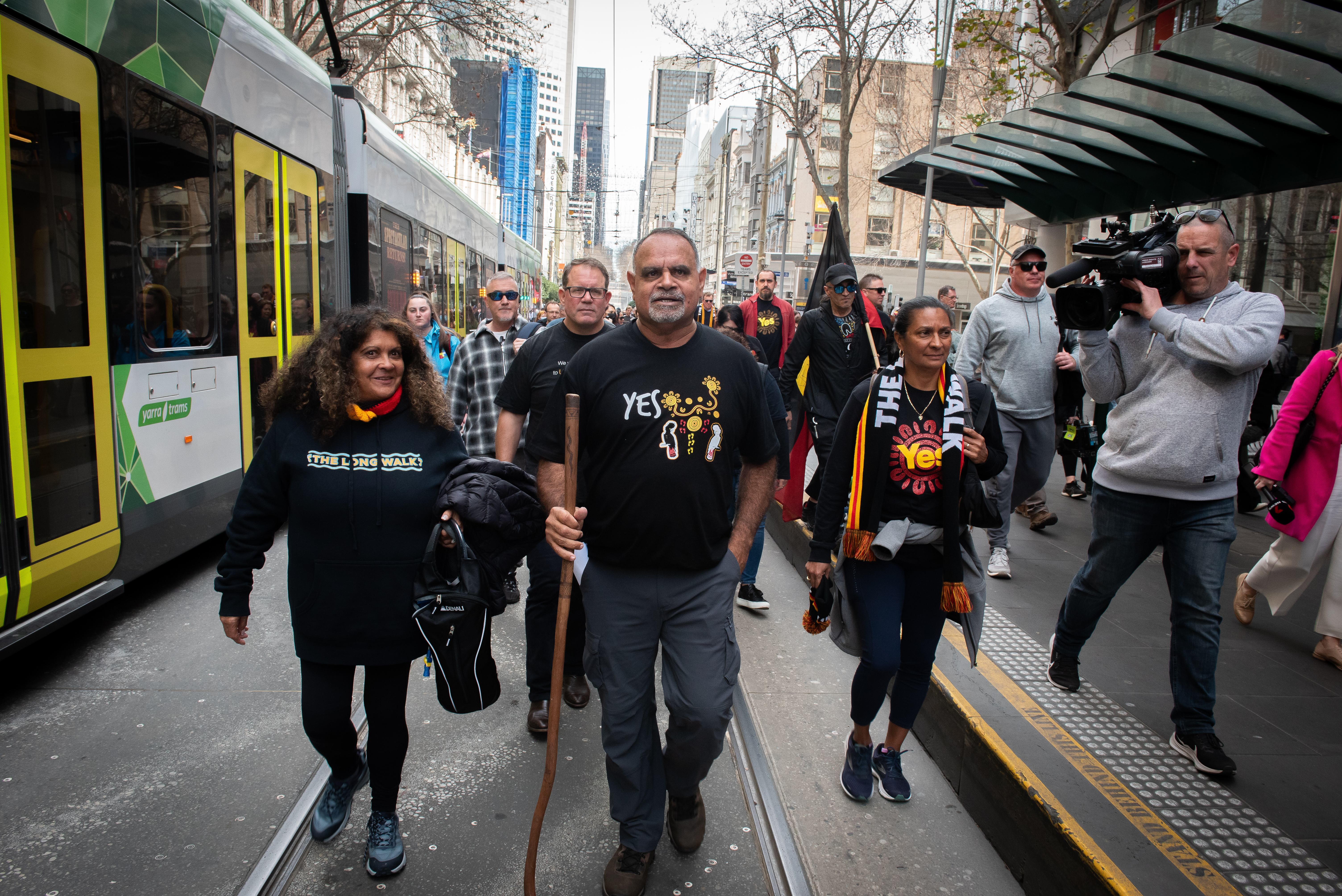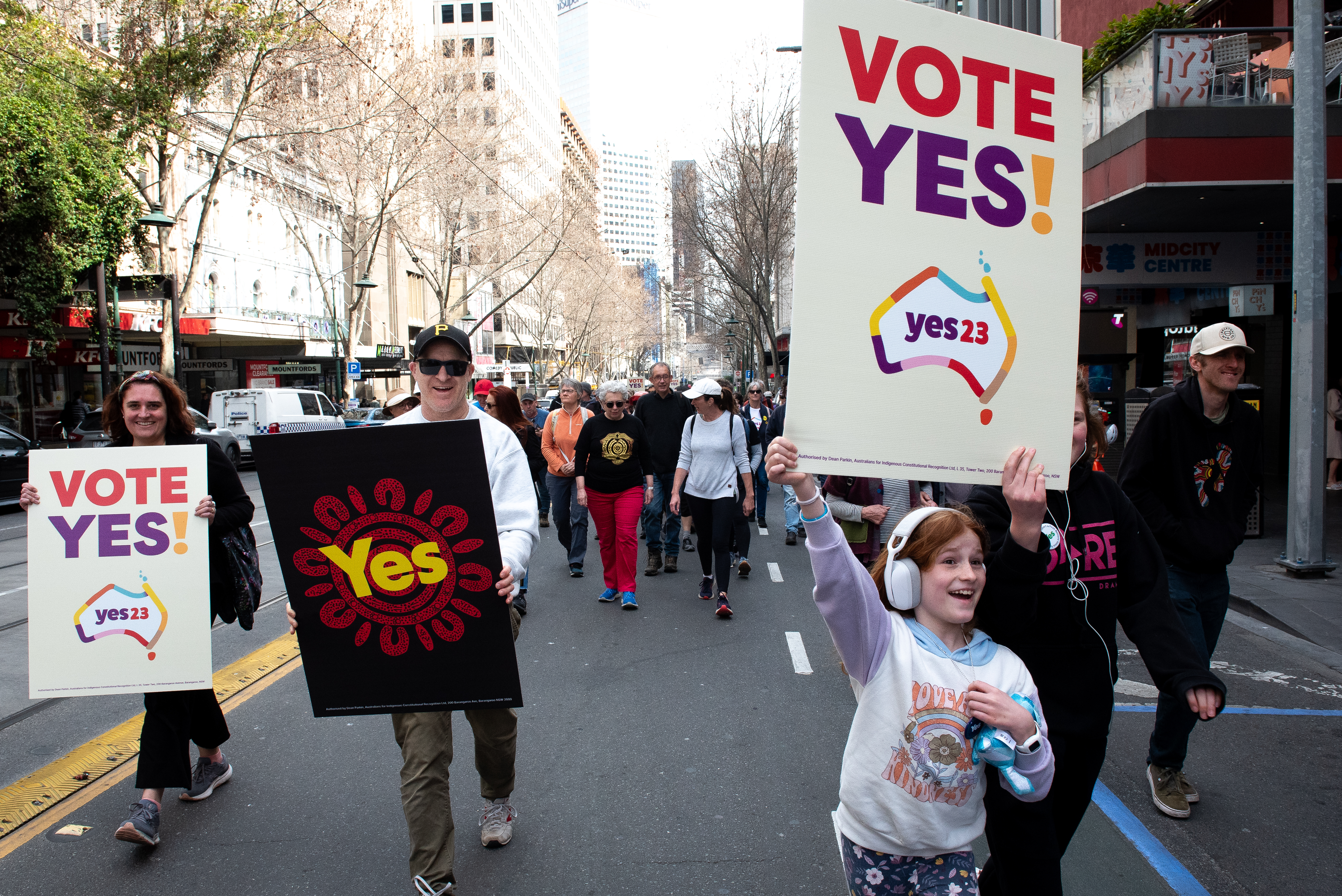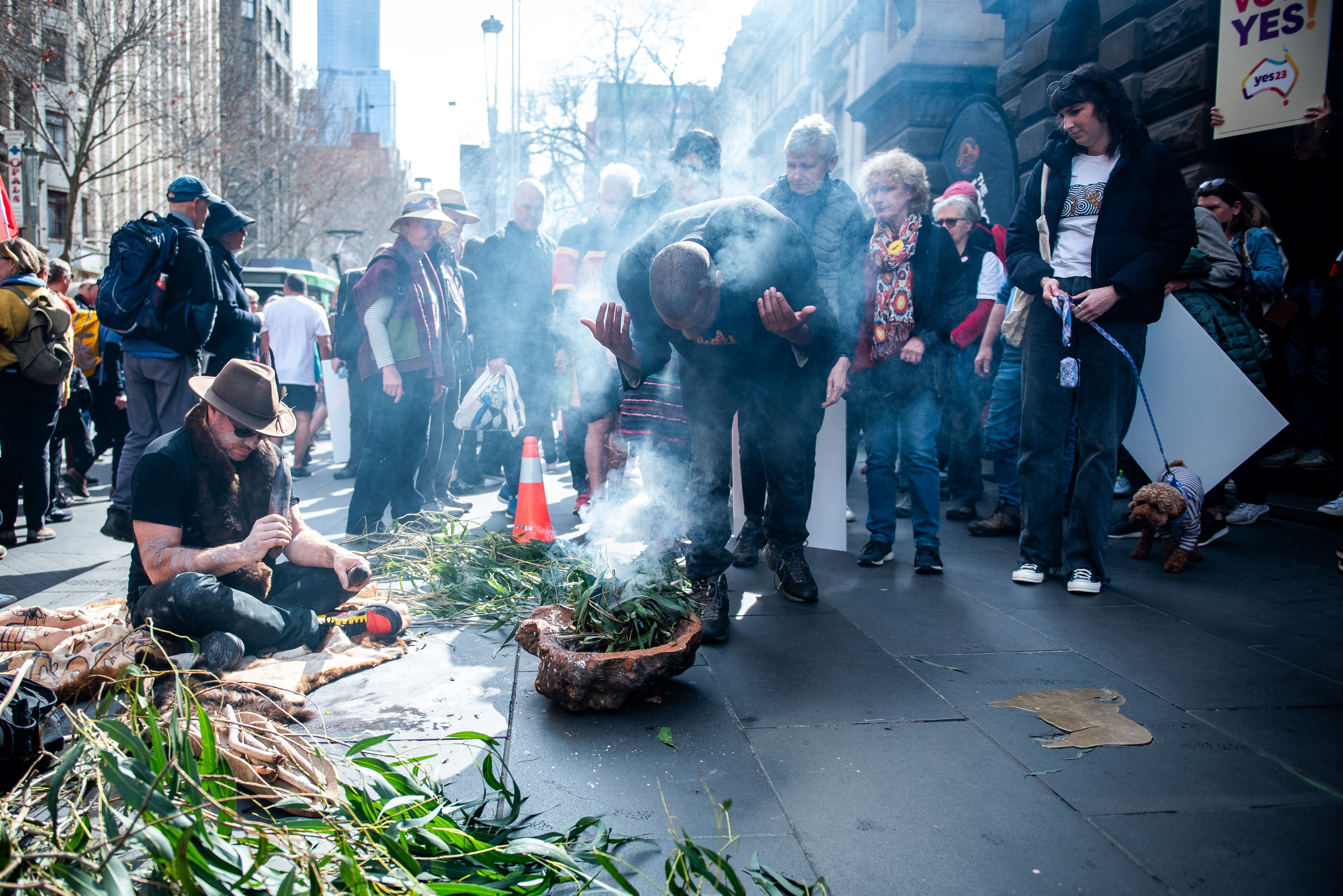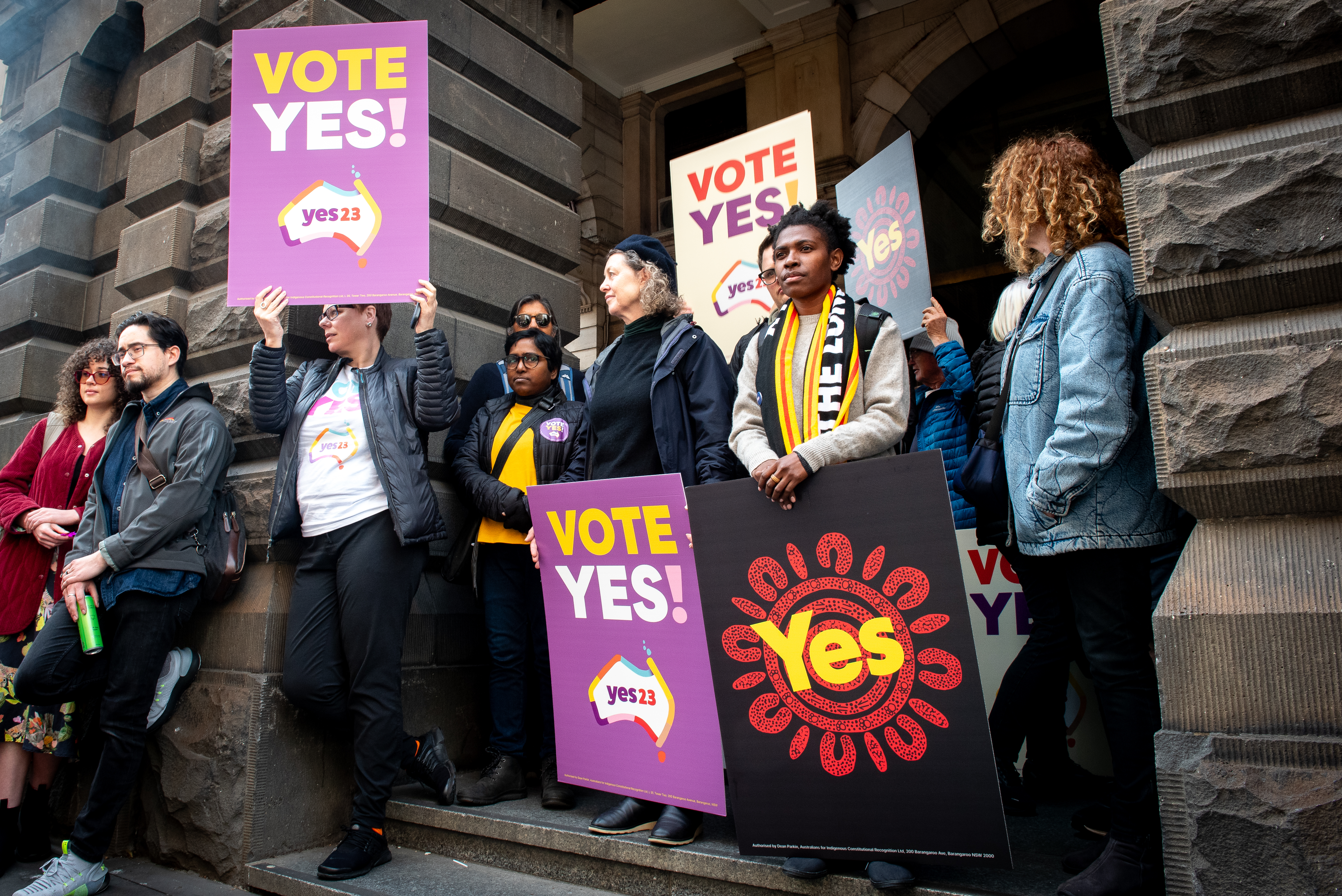
Melbourne, Australia – Retired Indigenous football star Michael Long has set out on a 650km (403 miles) walk from Melbourne to Canberra in support of the upcoming referendum on Indigenous rights.
The vote will take place on October 14, Prime Minister Anthony Albanese announced in the southern city of Adelaide on Wednesday.
If successful, the vote will see Australia’s Constitution amended to acknowledge Aboriginal and Torres Strait Islander people and create an all-Indigenous advisory board within the federal government.
Known as the “Voice to Parliament“, the proposal stems from a 2017 Indigenous community conference held at Uluru in Central Australia during which a constitutional amendment was proposed along with plans for a treaty as well as a truth and reconciliation process.
Originally making the same walk 19 years ago to raise awareness of the inequalities experienced by Aboriginal and Torres Strait Islander people, Long decided it was necessary to repeat the feat to boost support for the upcoming vote.
“You’ve got to remain optimistic that something’s got to change,” he told Al Jazeera. “We are always trying to advocate for reconciliation. And now, this is presented in front of us, this referendum. Hopefully [by raising awareness] Australians can get a deeper understanding of what this is really about.”

Making up about three percent of the overall population, Indigenous Australians continue to experience severe inequalities, including lower life expectancy, higher incarceration rates and, in some areas, endemic poverty.
Supporters of the ‘Voice’, as it has become known, hope the proposal will be a means to reverse such devastating statistics.
Albanese said the vote was a “once in a generation chance to bring our country together, and to change it for the better. You are being asked to vote for an idea – to say yes to an idea whose time has come,” he told the crowd of a few hundred people in Adelaide.
The referendum will see voters asked whether they agree to “alter the Constitution to recognise the First Peoples of Australia by establishing an Aboriginal and Torres Strait Islander Voice”.
Despite the optimism of advocates such as Long, however, recent polls demonstrate a decline in support for the proposal by the Australian public, dipping below the 50 percent majority required.
Voting is compulsory in Australia and majority approval is the only way in which amendments to the nation’s constitution can occur.
Misinformation, racism
Historically, referendums have little chance of succeeding.
Since Australia’s Federation in 1901,19 referendums have proposed 44 changes to the Constitution but only eight have won support.
Tellingly, however, the country’s most successful referendum also concerned Indigenous rights.
In 1967, more than 90 percent of Australians voted to count Indigenous people in the national census and grant powers to the federal government to make decisions for Aboriginal people.
Previously, Aboriginal affairs were a state concern.
However, the constitutional amendment proposed by the current government appears a far more complex issue for voters, underscored by misunderstandings about the powers involved in a “Voice to Parliament”, diverging views among the Indigenous community itself, and racism.
Such misinformation was apparent immediately after the proposal for the constitutional change was made public in 2017.
Then-Prime Minister Malcolm Turnbull was quick to reject the proposal, falsely claiming that an Indigenous advisory body would create a “third chamber” of government.
Turnbull later retracted the statement and has since publicly supported the proposal but such concerns continue to be raised, particularly on the right of Australian politics.
In 2022, Peter Dutton, who heads the opposition Liberal Party, suggested that Indigenous people would hold veto powers over mining rights and recently claimed the Voice would create “an Orwellian effect where all Australians are equal, but some Australians are more equal than others”.
Meanwhile, One Nation Senator Pauline Hanson spread a misleadingly edited video suggesting a “Yes” vote in the referendum would lead to increasing conflict between Indigenous and non-Indigenous Australians.
That little has been revealed about how the Voice would operate in legislative terms after being enshrined in the constitution has made it easier for misinformation to spread.

Racist commentary has also flared significantly on social media throughout the campaign, with the First Peoples’ Assembly of Victoria – a state Indigenous advisory and treaty group – complaining to social media giant Meta about the increase in offensive content in recent months.
Meta agreed to crack down on racial abuse and misinformation, with the National Indigenous Times reporting a representative told a Senate inquiry the company was “very mindful of the potential impact from the current public debate for Indigenous communities” in the lead-up to the referendum.
Larissa Baldwin-Roberts is the chief executive officer of political campaign group Get Up and an Indigenous Widjabul Wia-bal community member from the Bundjalung Nations.
She told Al Jazeera that the “No” campaign “recycles a lot of stereotypes about First Nations people. And those are really easy for middle Australia to connect with in terms of [stereotypes such as] special rights and special handouts and division and segregation.
“We know that most Australians actually don’t know First Nations people. What they’re relying on is the things that they hear the most about us as well,” she said.
What’s the vision?
Baldwin-Roberts added that the “Yes” campaign “has really failed to sell a vision around what [the Voice to Parliament] is actually going to mean for people. And when you fail to connect those dots, people [ask], ‘Wait, is this thing even worth it?’”
Compounding the confusion are the divergent messages stemming from the Indigenous community itself.
Indigenous Senators Lidia Thorpe, from the independent Blak Sovereign Movement, and Jacinta Price, who represents the conservative Country Liberal Party, for example, are against the Voice, with Thorpe advocating instead for truth telling and a treaty and Price calling for what she refers to as “grassroots” action.
Baldwin-Roberts says this mixed messaging from Indigenous people also undermines confidence in the proposal.
“We’re hearing from different First Nations people saying, ‘This isn’t good enough’. And [the Australian public] are like, ‘I haven’t got enough information to make up my mind’.”

Dean Parkin, the campaign director from the national Yes23 advocacy group, told Al Jazeera the campaign remains confident, despite flagging polls.
“We’ve never been focused on the published polls. We’ve known that 40 percent of the Australian population have yet to make their mind up on the Voice to Parliament referendum,” he said.
“We see that as a tremendous opportunity. When you actually sit down and have that conversation with Australians, they see what a simple, what a fair and a unifying proposal this really is. We are simply talking about recognising Indigenous peoples as the First Peoples of our nation. And doing so through a really practical means through a Voice to Parliament.”






